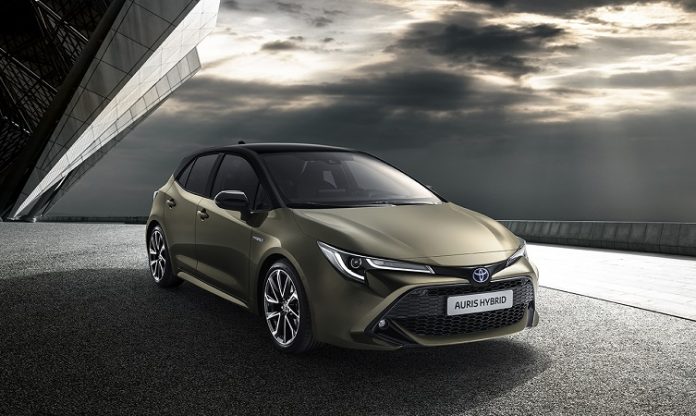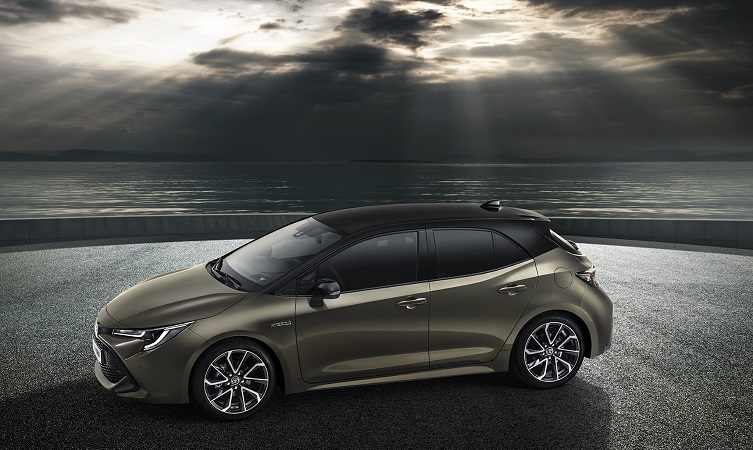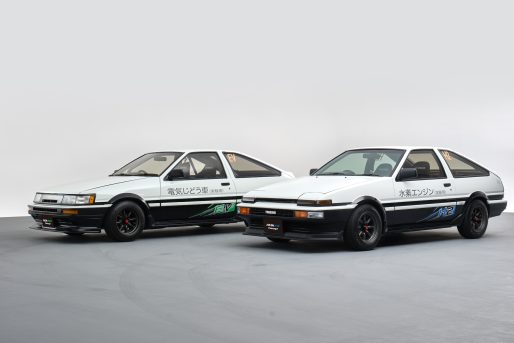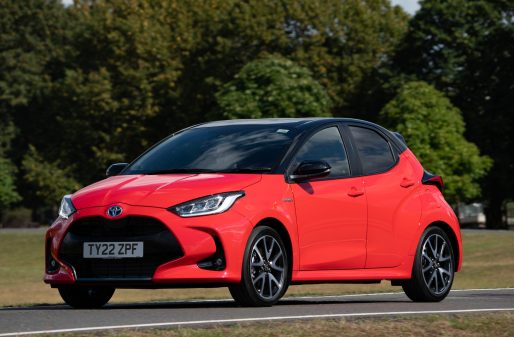Please note that following Toyota’s announcement on 28 August 2018, all versions of this next-generation C-segment model will be known worldwide as the Toyota Corolla.
Learn more: Toyota Corolla enters an exciting new era
The new Auris, to be built at Toyota Manufacturing UK’s Burnaston factory from next year, will be offered with a choice of three powertrains, including two hybrid electric vehicle (HEV) systems.
• 1.2-litre turbo – a 114bhp four-cylinder, direct injection turbocharged petrol engine
• 1.8-litre HEV powertrain – 121bhp fourth generation HEV system, as currently featured in the Toyota Prius and Toyota C-HR
• 2.0-litre HEV powertrain – a new, more powerful Toyota New Global Architecture (TNGA) HEV powertrain producing 178bhp
The new generation Auris will be offered only with petrol and HEV powertrains; similar to the decision Toyota took with Toyota C-HR in 2016, there will be no diesel version.
Strong customer demand for HEV versions of its core models is prompting Toyota to phase out diesel from all its passenger cars in 2018.

In 2017, HEVs accounted for 41 per cent of Toyota Motor Europe’s total sales, an increase of 38 per cent year-on-year to a total of 406,000 units. By contrast, the diesel mix for Toyota passenger cars was less than 10 per cent during the same year.
Toyota will continue to offer diesel engines in commercial vehicles (including Hilux, Proace and Land Cruiser) to meet customer needs.
Johan van Zyl, President and CEO of Toyota Motor Europe, said: “Toyota has been pioneering hybrid electric vehicle technology for more than 20 years. For several years, HEVs have been the dominant powertrain where they have been offered.
“In our latest new model, the Toyota C-HR, HEVs accounted for 78 per cent of sales last year.
“As part of our electrified vehicle strategy, we are progressively expanding our HEV offering with a second, more powerful 2.0-litre engine. Starting with the new generation Auris, this expanded HEV line-up is a natural reaction to our passenger car customers’ demands.
“Toyota’s HEV mix in passenger cars reached equality with the diesel mix in 2015. Since then, HEV sales have substantially exceeded those of our diesels. In commercial vehicles, where personal and business needs (for example, torque and payload) remain, we will continue to offer the latest technology diesels.”





Will the new auris be in both forms hatchback and tourer ?
Hi Robert,
Thanks for getting in touch. Unfortunately, we’re unable to provide any details on this at the moment. However, keep an eye on our blog and social media pages for the latest updates. Thanks.
I am slightly confused as to Toyota’s view of the hybrid with the introduction of a larger engine. I thought the idea was to have a low torque but very efficient engine coupled to a high torque electric motor. Therefore to increase the performance the logical route would be to look at the electrical side – an upgrade to the battery (lithium ion rather than NIMH) and some inverter tweaks would have probably given class leading acceleration. Surely, in the UK family car market, a top speed of over 100mph is not necessary, so neither is a larger petrol engine.
Hi Mike,
Thanks for getting in touch.
Toyota has developed a new hybrid system of for 2.0-litre engines, which applies the same size reducing, weigh-reducing, and
loss-reducing technologies used in the fourth-generation Prius. The new system realizes improved driving performance while
retaining superior fuel efficiency.
When accelerating, the hybrid system reduces engine rotations while drawing increased electric power from the battery, thereby
delivering a linear and lengthened sense of acceleration.
The petrol engine is a new 2.0-litre direct-injection, in-line 4-cylindre gasoline engine. It will achieve a thermal efficiency of 41%.
Compare to the conventional 1.8L Hybrid, the new engine has more power and torque hence more acceleration feel at lower
rpm.
The new Power Control Unit (PCU) is 20% smaller, and 10% lighter than the conventional 1.8L Hybrid, which allows it to be
placed directly above the transaxle.
The motor features a new rolling-coil structure with fewer wires, and also uses a newly developed magnetic steel. A new parallel
reduction gear format helps to reduce the loss in the transaxle by more than 25%.
All technical specifications will be revealed closer to the vehicle launch.
Hope this helps.
Thanks for the reply.
My thoughts are that the geeky technologist’s competitor to the British built Auris in the UK, is the British built Nissan Leaf.
The new Leaf is now very fast to 60 mph but has a low top speed. Top speeds are not something that can be used in the UK, so it is now acceleration that is wanted and electric motors give this feature – check out Tesla and its ludicrous mode.
Now that the Auris is designed, can I ask that you consider a different route for the Yaris (I own a Yaris Hybrid).
My benchmark for performance in this area is the BMW i3 and beleive that Toyota could easily create a Yaris Hybrid that could do 0-60 mph in 6 seconds by just upgrading the electrical side (leaving the petrol engine as standard).
My wish list is a Yaris Hybrid with a plug in facility, a small 1 or 2 kWh lithium battery (kept in existing place under rear seat), 0-60 mph in 6 seconds, 100mph top speed, pre-conditioning facility, heated seats, heated steering wheel and an option of 4 wheel drive (rear electric motor).
Best get one out before small competitor EVs have a 250 mile range.
Hi Mike,
We love your enthusiasm. We have no information on this at the moment but rest assured the best is yet to come. Keep an eye on our blog and social media channels for the latest updates.
Thanks.
I am an enthusiastic owner of an Auris Hybrid Tourer and I am waiting for the new 2.0L version, which should rectify my biggest grumble, which is the lack of grunt at motorway speeds. However, what is more important is the lack of distance in electric only drive. Is the new Auris going to be a plug-in hybrid sufficient to give an urban range of at least 30 miles, so that your cars can compete with VW, BMW, and the rest of the German cars?
If not, I’m afraid it will be goodbye Toyota, hello BMW, VW, Volvo, Renault, etc etc.
Hi Robert,
Thanks for getting in touch.
Whilst the electric only range is short, our hybrid vehicles are constantly recharging themselves therefore eliminating the need for you to plug your vehicle in. Every time you put your foot on the brake or lift off the accelerator, the system diverts energy back to the battery where it is, in effect, recycled. Instead of the energy being lost as heat or noise from the brakes, it is captured and then used to power the electric motor later. You can read more here: https://mag.toyota.co.uk/how-does-toyota-hybrid-synergy-drive-work.
If you would like a Toyota plug in vehicle you can have a look at our Prius plug-in. It offers a range of 39 miles in electric drive. You can read more about the Prius plug-in here: https://www.toyota.co.uk/new-cars/prius-plugin/.
In terms of the new Auris, we can not comment on new details yet. Be sure to keep an eye out on our social channels and blog for the most up to date information.
We hope this helps.
Thanks.
I still don’t think it’s worth buying any Toyota as they lack the vision for Lithium battery. Instead they are now coming up with Hydrogen fuel cell.
Remember most of their designs are Japanese which in itself lack creativity.